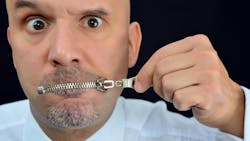Joe Strummer, former lead singer of the punk band, The Clash, famously said, “People can change anything they want to, and that means everything in the world.” In my inaugural column, I’d like to address the collision industry engagement with government regulators. I spend a significant part of my time participating in many government workshops in my home state of California, as the current and impending regulations we face as repairers are vast and widespread. There is a litany of acronyms for all the various agencies we must interface with: AQMD, BAR, CPPA, CUPA, OSHA, CDI. For most repairers, it’s a frustrating mess of legalese and alphabet soup. Mix that in with the daily operation of your body shop, and that leaves most repairers deciding to opt out of participating.
Most recently, the Bureau of Automotive Repair (BAR) hosted a workshop to review draft language to amend and expand the storage laws in California, which largely revolve around addressing problematic behavior impacting the insurance community. California Auto Body Association (CAA) participates in all these workshops, and a handful of collision repairers also engage. Shockingly (or maybe not?), most of the open mic commenters were claims managers, subrogation litigators, and individuals acting on behalf of the insurance company’s interests. I must hand it to them — they were polished, knowledgeable, and aggressive. They carefully analyzed the draft language, redlined the portions they wanted to change, and articulated their proposals clearly to the BAR. Rather than addressing the draft language, and offering potential collaborative approaches to addressing their concerns, the collision repairers who chose to speak up used their speaking time to sling mud at the insurance industry for excessive supplemental inspection delays, abandoned vehicles, and poor communication. Are these concerns valid? Definitely. Was it the right time and place to bring it up? Definitely not. I was embarrassed and disappointed. I could visibly see the disapproving body language of the BAR employees when these individuals spoke. As repairers, we already feel that this is an imbalanced fight, but we must do better than what I witnessed. I have met so many brilliant minds in our industry, and I know that we are better represented than this.
So where do you start? Obviously, when you can participate, and how much time you invest in activities like these is top priority in determining your bandwidth to be involved. Most of the public workshops for all the government entities are posted on their website, and some even allow you to subscribe to a newsletter to get notified in advance of an upcoming workshop. Should that not appeal to you, join a body shop association. Share your frustrations with their board of directors, communicate/network with other shops, and learn how they handle the same problems you face. It is extremely fulfilling and satisfying to be amongst other professionals working to accomplish the same goals as you are. CAA, for example, is extremely active in working with government regulators, and acts as our voice for California collision repairers.
In closing, it’s easy to stand on the sidelines and complain about what’s going on around you. If you don’t like what you are seeing, do something about it! But be smart about what you say and how you say it. Do the research, be aware of the regulations’ future impact, and consider the underlying root causes of what is driving these regulations. Have an informed, professional voice, and know your rights. Regulators are people just like you and me. If the only voice they hear is from the insurance community, don’t be surprised when regulations are imbalanced and in their favor. Collectively, we have the power to affect the change we want to see. What are you going to do about it?
The Clash’s music brought to light the plight of many causes around the globe, thrusting these subjects to the forefront of the population to bring awareness and drive change. I’m no Joe Strummer, but I will gladly carry the torch for our cause.
About the Author

Andrew Batenhorst
Andrew Batenhorst is the body shop manager for Pacific BMW Collision Center. He has worked in the automotive industry for the past 25 years and currently sits on the SCRS board as the director-at-large. He also is the Glendale/Foothill Chapter president for the California Autobody Association. He has a bachelor's degree in business administration from Cal State Northridge. Connect with him on LinkedIn.
